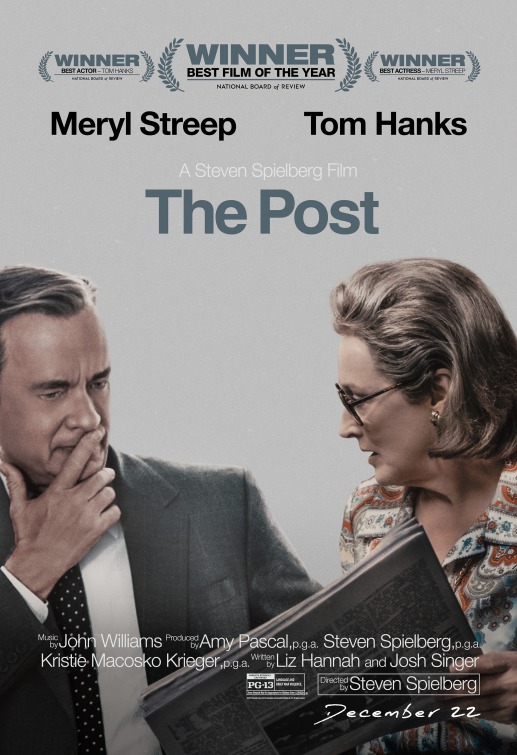Despite an underdeveloped main character and a poorly explored sense of feminism, the new movie release The Post confirmed the essential nature of mentioning the freedom of the press in the First Amendment. Though flawed, the movie could not have been released at a better moment in history than present-day America, where journalists have to fight harder than ever for the truth, which is more often than not passively dismissed as fake news. Viewers, if they are able to look beyond a few cinematic missteps, will be no less than inspired by the characters’ resilience, no less than hopeful for the future of journalism.
Meryl Streep played Kay Graham, an American publisher who oversaw her family’s newspaper, The Washington Post. Graham, despite a handful of hard-hitting, assertive lines, was portrayed as a feminine powerhouse of sorts only between hosting cocktail parties and birthday bashes. Her character was a woman who, though brilliant, seemed to hold a position of power by means of inheritance alone. At least in the film, The Washington Post mirrored a journalistic monarchy in which the succeeding heir rightfully claimed her throne.
“It is not my father’s company. It is not my husband’s company. It is my company,” she says toward the end, asserting her earned status as head of the company after her father and husband, both previous owners, had passed away.
Only at this moment did I feel her dilly-dallying between fancy dinners and comfortable moments over fine china amounted to anything worthy of inspiration. The preceding scenes granted the viewer only tiny glimpses of her talent and ability. I do not doubt Meryl Streep’s talent or ability as an actress; I do, however, doubt the credibility of Kay Graham. Graham was likely brilliant in real life, but the movie failed to thoroughly establish her credentials aside from a singular moment of confident decision-making, ultimately determining the course of the plot.
I understand where director Steven Spielberg was coming from. Had Graham been portrayed as a female character worthy of praise from the beginning, perhaps her ultimate “coming of age” as a strong woman in a male-dominated industry would have been less effective cinematically; still, I can’t help but wish her confidence was noted earlier on. As a young female journalist, I found it almost discouraging that she was only able to “make it” having started from the top. I was hoping for another Sacha Pfeiffer from Spotlight. Instead, a hodgepodge of stern, male voices served as a backdrop to Graham’s small handful of assertive lines, illuminating her minimal contributions only thanks to a stark male comparison.
Additionally, I found the minimal coverage of arguably the most important character — Daniel Ellsberg (played by Matthew Rhys) — quite striking. In 1971, real-life Ellsberg met with reporter Neil Sheehan of The New York Times and revealed to him a portion of the top-secret Pentagon Papers, later revealing them to the Washington Post. Movie character Ellsberg was in the front-line in Vietnam, gathered information from top officials, deliberately stole top secret files and served as a source to the Times and the Post when he, I assume, personally felt it was the right thing to do for the sake of the American people. Both in real life and in the move, the story would not have existed without him, yet much of the film focused on the Post’s internal staff structure, especially those at the top. Many of the characters who received praise and screen-time were comparatively undeserving.
Criticism aside, one moment stood out to me as extremely well-portrayed: the speech by Ben Bradlee (Tom Hanks) to Kay Graham (Meryl Streep), in which Ben calls out Graham for being closely related to White House personnel (when, as a journalist, she should be holding them accountable and maintaining a sense of skepticism). This scene was a watershed moment in itself, especially for Graham. The vocalization of her faults as a friendly ally with the very powerhouse she was supposed to be holding accountable marked a turning point for the direction of the plot — no more would the paper operate by making friendly connections, but by decision-making based upon The Post’s mission to be a voice for the people.
The film, through moments like this one, explored many journalistic topics that Americans need to talk about openly. A hostility towards the industry lingers in the public air, but as with any industry, there will be bad apples who fail to recognize and uphold their moral and social responsibilities. While some journalists are susceptible to certain biases, many others seek the hard truth at all costs, because they realize, as many Americans do, that the freedom of the press must stand.
Luke Buckmaster, writing for the Daily Review, felt differently: “The idea that a major news organization would invest huge amounts of time, with a large number of highly talented and experienced journalists, on a single story that sends tremors through the corridors of power — that feels rather quaint now. Trump would decry The Post’s exposé, sight-unseen, as fake news. And his supporters would either believe him, or not care.”
Buckmaster has a point, I admit solemnly — but, to me, attitudes of hostility and hopelessness toward journalism are the very reason for the creation of this movie at this moment in time. The American people feel betrayed by both the administration and the media, and while the answers are never black or white, this film poses as a watershed moment for the curious viewers pouring into theaters each day — turning slowly away from an era of skepticism, and surely toward a process of healing that will hopefully reestablish the significance of the freedom of the press. If nothing else, The Post begins to patch up the wounds of Americans who are told vehemently to deny the media’s credibility at all costs.



